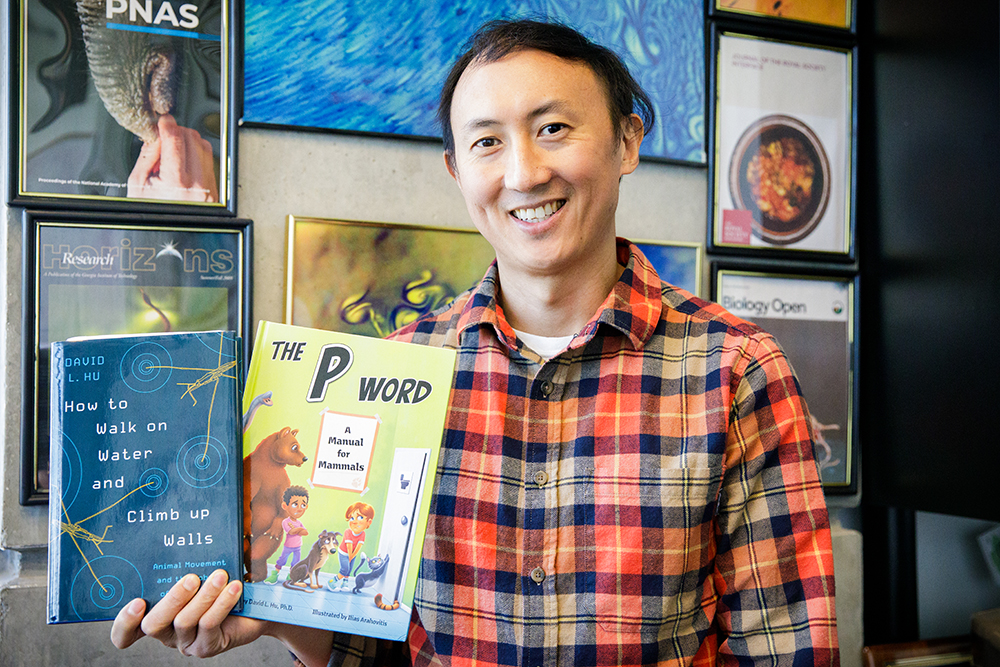October 23, 2023
By Chloe Arrington
David Hu, professor in the George W. Woodruff School of Mechanical Engineering and School of Biological Sciences at Georgia Tech, has been elected a 2023 American Physical Society (APS) Fellow for his innovative experiments in biological fluid mechanics and his willingness to share them with young scientists. Hu’s nomination came from the APS Division of Fluid Dynamics (DFD).
The APS Fellowship Program recognizes members who have made exceptional contributions in physics research, important applications of physics, leadership in or service to physics, or significant contributions to physics education. Each year, less than 10 members from the APS DFD community receive this elevation and this year only eight Fellows were selected.
Hu conducts out-of-the-box experiments and discovers new scaling laws governing animal motion. He has used rheometers to characterize the visco-elasticity of fire ant rafts, which provides a useful metric for characterizing the swarm; he has shown how cats use capillarity to clean themselves with their tongues and has a U.S. patent on a cat-inspired hairbrush; and he has studied how mosquitoes and insects can fly through rainstorms without injury and discovered scaling rules that govern urination and defecation across body size.
Hu has a long history with fluid dynamics and other APS Fellows, and both have influenced and inspired his career.
“I took my first fluid mechanics class in 1999. The instructor had xeroxed articles about MIT's ‘RoboTuna,’ the first robot to use flexible fins to move. That teacher, Gareth McKinley, was an APS Fellow,” said Hu. “Every fluid mechanics class I took after that was taught by an APS Fellow.”
Hu has taught fluid mechanics for 13 years at Georgia Tech and describes it as a beautiful subject that has resonated with him since that first class in 1999. “It was visually breathtaking, the ocean, the rain, the kitchen sink,” stated Hu. “It relied on math, which I liked, and even strange phenomena could be explained in elegant ways.”
Hu communicates his passion for fluid mechanics through his experimental videos, talks, interviews, and writing. He comments regularly on fluid mechanics news in The New York Times and NPR. He published a popular science book How to Walk on Water and Climb up Walls: Animal Movement and Robots of the Future, with Princeton University Press in 2018. The book was a 2020 Finalist for the American Association for Advancement of Science (AAAS) /Subaru Prize for Excellence in Science Books, was recognized by the American Institute of Physics (AIP) Science Communication Award, Forbes’ Twelve of The Best Books About Biology and Inverse's Best Science Books. He also wrote a children’s book The P Word (Science Naturally, 2023).
Hu pointed out that his Ph.D. advisor, postdoc advisor, members of his Ph.D. committee, and members of his qualifying exam committee were all APS fellows.
“I am humbled to be elected among my teachers and mentors who have taught me everything I know,” said Hu. “I see that I have a responsibility, like the previous generation of fellows, to represent the subject matter well, make the difficult decisions, and help foster the next generation of fluid mechanics, whatever it may look like.”
Hu remembers one key takeaway from his Ph.D. advisor, John Bush, that scientists should not hide in labs. “We should shock and delight the public whenever we can!” Hu said. Hu describes fluid mechanics as a “unique subject because it is visual and all around us all the time. Therefore, everyone can appreciate and remember it, no matter if they have studied physics or not."
Hu also acknowledged the ‘creative and hardworking’ Ph.D. students in his lab he described as patient and brave to work with him. “I owe the graduate students everything.”
Hu has published 70 peer-reviewed journal publications, including in Nature, PNAS, Journal of Fluid Mechanics, and Physical Review Fluids. He is the recipient of two Ig Nobel Prizes, awards given at Harvard University for “research that makes you laugh then think,” two Pineapple Science Prizes, known as the Ig Nobel Prizes of China, and the NSF CAREER Award. He is an associate editor for Proceedings of the Royal Society B and on the board of Journal of Experimental Biology.
He serves DFD by founding and leading the annual All the Faces of Fluid Dynamics lunches on diversity, co-organizing DFD workshops on science communication, and participating in DFD media relations committee (as member and vice-chair) and DFD nominating committee.
Hu will be formally recognized at the 76th Annual Meeting of the Division of Fluid Dynamics, taking place in Washington, D.C. next month.

